- Home
- Anthony Doerr
The Shell Collector Page 4
The Shell Collector Read online
Page 4
No. There was no time. The venom had spread to his chest. He remembered this: blue. He remembered how that morning one of the Jims had praised the blue body of a reef fish. “That blue,” he’d said. The shell collector remembered seeing blue in ice fields, in Whitehorse, as a boy. Even now, fifty-five years later, after all his visual memories had waned, even in dreams—the look of the world and his own face long faded—he remembered how blue looked at the bottom pinch of a crevasse, cobalt and miraculous. He remembered kicking snow over the lip, tiny slivers disappearing into an icy cleft.
Then his body abandoned him. He felt himself dissolve into that most extravagantly vivid of places, into the clouds rising darkly at the horizon, the stars blazing in their lightless tracts, the trees sprouting up from the sand, the ebbing, living waters. What he must have felt, what awful, frigid loneliness.
The girl, Seema, the mwadhini’s daughter, found him in the morning. She was the one who had come, every week since her recovery, to stock his shelves with rice and dried beef, to bring him toilet paper and bread and what mail he had and Uhu milk in paper cartons. Rowing there from Lamu with her nine-year-old arms, out of sight of the island, of other boats, with only the mangroves to see, sometimes she would unpin her black wraparound and let the sun down on her shoulders, her neck, her hair.
She found him awash, faceup, on a stretch of white sand. He was a kilometer from his home. Tumaini was with him, curled around his chest, her fur sopped, whining softly.
He was barefoot; his left hand was badly swollen, the fingernails black. She took him up, his body that smelled so much like the sea, of the thousands of boiled gastropods he had tweezered from shells, and heaved him into her little boat. She fitted the oarlocks and rowed him to his kibanda. Tumaini raced alongside, bounding along the shore, pausing to let the boat catch up, yelping, galloping off again.
When they heard the girl and the dog come clattering up to the door, the Jims burst from their sleeping bags, their hair matted, eyes red, and helped in the best ways they knew. They carried the shell collector in and with the girl’s help radioed Dr. Kabiru. They wiped the shell collector’s face with a washcloth and listened to his heart beating shallowly and slowly. Twice he stopped breathing and twice one of those big writers put his mouth on the shell collector’s and blew life into his lungs.
He was numb forever. What clockless hours passed, what weeks and months? He didn’t know. He dreamed of glass, of miniature glass-blowers making cone teeth like tiny snow-needles, like the thinnest bones of fish, vanes on the arms of a snowflake. He dreamed of the ocean glassed over with a thick sheet and him skating out on it, peering down at the reef, its changing, perilous sculpture, its vast, miniature kingdoms. All of it—the limp tentacles of a coral polyp, the chewed floating body of a clownfish—was gray and lonesome, torn down. A freezing wind rushed down his collar, and the clouds, stringy and ragged, poured past in a terrible hurry. He was the only living thing on the whole surface of the earth and there was nothing to meet, nothing to see, no ground to stand on.
Sometimes he woke to chai pouring into his mouth. He felt his body freeze it, ice chunks rattle through his guts.
It was Seema who warmed him, finally. She visited every day, rowing from her father’s jumba to the shell collector’s kibanda, under the white sun, over the turquoise waters. She nursed him out of bed, shooed the siafu from his face, fed him toast. She began walking him outside and sitting with him in the sun. He shivered endlessly. She asked him about his life, about shells he had found and about the cone shell that saved her life. Eventually she began to hold his wrists and walk him out into the lagoon and he shivered whenever air touched his wet skin.
The shell collector was wading, feeling for shells with his toes. It had been a year since he’d been bitten.
Tumaini perched on a rock and sniffed at the horizon where a line of birds threaded along beneath stacks of cumulus. Seema was on the reef with them, as she had been nearly every day, her shoulders free of her wraparound. Her hair, usually bound back, hung across her neck and reflected the sun. What comfort it was to be with a person who could not see, who did not care anyway.
Seema watched as a school of fish, tiny and spear-shaped, flashed just below the surface of the water. They stared up at her with ten thousand round eyes, then turned lazily. Their shadows glided over the rutted sand, over a fern-shaped colony of coral. Those are needlefish, she thought, and that is Xenia soft coral. I know their names, how they rely on each other.
The shell collector moved a few meters, stopped and bent. He had come across what he thought was a bullia—a blind snail with a grooved, high-spired shell—and he kept his hand on it, two fingers resting lightly on the apex. After a long moment, waiting, tentative, the snail brought its foot from the aperture and resumed hauling itself over a ridge of sand. The shell collector, using his fingers, followed it for a while, then stood. “Beautiful,” he murmured. Beneath his feet the snail kept on, feeling its way forward, dragging the house of its shell, fitting its body to the sand, to the private unlit horizons that whorled all around it.
THE HUNTER’S WIFE
It was the hunter’s first time outside of Montana. He woke, stricken still with the hours-old vision of ascending through rose-lit cumulus, of houses and barns like specks deep in the snowed-in valleys, all the scrolling country below looking December— brown and black hills streaked with snow, flashes of iced-over lakes, the long braids of a river gleaming at the bottom of a canyon. Above the wing the sky had deepened to a blue so pure he knew it would bring tears to his eyes if he looked long enough.
Now it was dark. The airplane descended over Chicago, its galaxy of electric lights, the vast neighborhoods coming clearer as the plane glided toward the airport—streetlights, headlights, stacks of buildings, ice rinks, a truck turning at a stoplight, scraps of snow atop a warehouse and winking antennae on faraway hills, finally the long converging parallels of blue runway lights, and they were down.
He walked into the airport, past the banks of monitors. Already he felt as if he’d lost something, some beautiful perspective, some lovely dream fallen away. He had come to Chicago to see his wife, whom he had not seen in twenty years. She was there to perform her magic for a higher-up at the state university. Even universities, apparently, were interested in what she could do.
Outside the terminal the sky was thick and gray and hurried by wind. Snow was coming. A woman from the university met him and escorted him to her Jeep. He kept his gaze out the window.
They were in the car for forty-five minutes, passing first the tall, lighted architecture of downtown, then naked suburban oaks, heaps of ploughed snow, gas stations, power towers and telephone wires. The woman said, So you regularly attend your wife’s performances?
No, he said. Never before.
She parked in the driveway of an elaborate and modern mansion with square balconies suspended at angles over two trapezoidal garages, huge triangular windows in the facade, sleek columns, domed lights, a steep shale roof.
Inside the front door about thirty name tags were laid out on a table. His wife was not there yet. No one, it seemed, was there yet. He found his tag and pinned it to his sweater. A silent girl in a tuxedo appeared and disappeared with his coat.
The foyer was all granite, flecked and smooth, backed with a grand staircase that spread wide at the bottom and tapered at the top. A woman came down. She stopped four or five steps from the bottom and said, Hello, Anne, to the woman who had driven him there and, You must be Mr. Dumas, to him. He took her hand, a pale bony thing, weightless, like a featherless bird.
Her husband, the university’s chancellor, was just knotting his bow tie, she said, and laughed sadly to herself, as if bow ties were something she disapproved of. Beyond the foyer spread a vast parlor, high-windowed and carpeted. The hunter moved to a bank of windows, shifted aside the curtain and peered out.
In the poor light he could see a wooden deck encompassing the length of the house, angled and ste
pped, never the same width, with a low rail. Beyond it, in the blue shadows, a small pond lay encircled by hedges, with a marble birdbath at its center. Behind the pond stood leafless trees—oaks, maples, a sycamore white as bone. A helicopter shuttled past, winking a green light.
It’s snowing, he said.
Is it? asked the hostess, with an air of concern, perhaps false. It was impossible to tell what was sincere and what was not. The woman who drove him there had moved to the bar where she cradled a drink and stared into the carpet.
He let the curtain fall back. The chancellor came down the staircase. Other guests fluttered in. A man in gray corduroy, with BRUCE MAPLES on his name tag, approached him. Mr. Dumas, he said, your wife isn’t here yet?
You know her? the hunter asked. Oh no, Maples said, and shook his head. No I don’t. He spread his legs and swiveled his hips as if stretching before a foot race. But I’ve read about her.
The hunter watched as a tall, remarkably thin man stepped through the front door. Hollows behind his jaw and beneath his eyes made him appear ancient and skeletal—as if he were visiting from some other leaner world. The chancellor approached the thin man, embraced him, and held him for a moment.
That’s President O’Brien, Maples said. A famous man, actually, to people who follow those sorts of things. So terrible, what happened to his family. Maples stabbed the ice in his drink with his straw.
The hunter nodded, unsure of what to say. For the first time he began to think he should not have come.
Have you read your wife’s books? Maples asked.
The hunter nodded.
In her poems her husband is a hunter.
I guide hunters. He was looking out the window to where snow was settling on the hedges.
Does that ever bother you?
What?
Killing animals. For a living, I mean.
The hunter watched snowflakes disappear as they touched the window. Was that what hunting meant to people? Killing animals? He put his fingers to the glass. No, he said. It doesn’t bother me.
The hunter met his wife in Great Falls, Montana, in the winter of 1972. That winter arrived immediately, all at once—you could watch it come. Twin curtains of white appeared in the north, white all the way to the sky, driving south like the end of all things. They drove the wind before them and it ran like wolves, like floodwater through a cracked dyke. Cattle galloped the fence-lines, bawling. Trees toppled; a barn roof tumbled over the highway. The river changed directions. The wind flung thrushes screaming into the gorge and impaled them on the thorns in grotesque attitudes.
She was a magician’s assistant, beautiful, sixteen years old, an orphan. It was not a new story: a glittery red dress, long legs, a traveling magic show performing in the meeting hall at the Central Christian Church. The hunter had been walking past with an armful of groceries when the wind stopped him in his tracks and drove him into the alley behind the church. He had never felt such wind; it had him pinned. His face was pressed against a low window, and through it he could see the show. The magician was a small man in a dirty blue cape. Above him a sagging banner read THE GREAT VESPUCCI. But the hunter watched only the girl; she was graceful, young, smiling. Like a wrestler the wind held him against the window.
The magician was buckling the girl into a plywood coffin that was painted garishly with red and blue bolts of lightning. Her neck and head stuck out one end, her ankles and feet the other. She beamed; no one had ever before smiled so broadly at being locked into a coffin. The magician started up an electric saw and brought it noisily down through the center of the box, sawing her in half. Then he wheeled her apart, her legs going one way, her torso another. Her neck fell back, her smile waned, her eyes showed only white. The lights dimmed. A child screamed. Wiggle your toes, the magician ordered, flourishing his magic wand, and she did; her disembodied toes wiggled in glittery high-heeled pumps. The audience squealed with delight.
The hunter watched her pink fine-boned face, her hanging hair, her outstretched throat. Her eyes caught the spotlight. Was she looking at him? Did she see his face pressed against the window, the wind slashing at his neck, the groceries—onions, a sack of flour—tumbled to the ground around his feet? Her mouth flinched; was it a smile, a flicker of greeting?
She was beautiful to him in a way that nothing else had ever been beautiful. Snow blew down his collar and drifted around his boots. The wind had fallen off but the snow came hard and still the hunter stood riveted at the window. After some time the magician rejoined the severed box halves, unfastened the buckles, and fluttered his wand, and she was whole again. She climbed out of the box and curtsied in her glittering slit-legged dress. She smiled as if it were the Resurrection itself.
Then the storm brought down a pine tree in front of the courthouse and the power winked out, streetlight by streetlight, all over town. Before she could move, before ushers began escorting the crowd out with flashlights, the hunter was slinking into the hall, making for the stage, calling for her.
He was thirty years old, twice her age. She smiled at him, leaned over from the dais in the red glow of the emergency exit lights and shook her head. Show’s over, she said. In his pickup he trailed the magician’s van through the blizzard to her next show, a library fund-raiser in Butte. The next night he followed her to Missoula. He rushed to the stage after each performance. Just eat dinner with me, he’d plead. Just tell me your name. It was hunting by persistence. She said yes in Bozeman. Her name was plain, Mary Roberts. They had rhubarb pie in a hotel restaurant.
I know how you do it, he said. The feet in the sawbox are dummies. You hold your legs against your chest and wiggle the dummy feet with a string.
She laughed. Is that what you do? she asked. Follow a girl to four towns to tell her her magic isn’t real?
No, he said. I hunt.
You hunt. And when you’re not hunting?
I dream about hunting. She laughed again. It’s not funny, he said.
You’re right, she said, and smiled. It’s not funny. I’m that way with magic. I dream about it. I dream about it all the time. Even when I’m not asleep.
He looked into his plate, thrilled. He searched for something he might say. They ate. But I dream bigger dreams, you know, she said afterward, after she had eaten two pieces of pie, carefully, with a spoon. Her voice was quiet and serious. I have magic inside of me. I’m not going to get sawed in half by Tony Vespucci all my life.
I don’t doubt it, the hunter said.
I knew you’d believe me, she said.
But the next winter Vespucci brought her back to Great Falls and sawed her in half in the same plywood coffin. And the winter after that. After both performances the hunter took her to the Bitterroot Diner where he watched her eat two pieces of pie. The watching was his favorite part: a hitch in her throat as she swallowed, the way the spoon slid cleanly out from her lips, the way her hair fell over her ear.
Then she was eighteen, and after pie she let him drive her to his cabin, forty miles from Great Falls, up the Missouri, then east into the Smith River valley. She brought only a small vinyl purse. The truck skidded and sheered as he steered it over the unploughed roads, fishtailing in the deep snow, but she didn’t seem afraid or worried about where he might be taking her, about the possibility that the truck might sink in a drift, that she might freeze to death in her pea coat and glittery magician’s-assistant dress. Her breath plumed out in front of her. It was twenty degrees below zero. Soon the roads would be snowed over, impassable until spring.
At his one-room cabin with furs and old rifles on the walls, he unbolted the crawlspace and showed her his winter hoard: a hundred smoked trout, skinned pheasant and venison quarters hanging frozen from hooks. Enough for two of me, he said. She scanned his books over the fireplace, a monograph on grouse habits, a series of journals on upland game birds, a thick tome titled simply Bear. Are you tired? he asked. Would you like to see something? He gave her a snowsuit, strapped her boots into a pair of leather snowsh
oes, and took her to hear the grizzly.
She wasn’t bad on snowshoes, a little clumsy. They went creaking over wind-scalloped snow in the nearly unbearable cold. The bear denned every winter in the same hollow cedar, the top of which had been shorn off by a storm. Black, three-fingered and huge, in the starlight it resembled a skeletal hand thrust up from the ground, a ghoulish visitor scrabbling its way out of the underworld.
They knelt. Above them the stars were knife points, hard and white. Put your ear here, he whispered. The breath that carried his words crystallized and blew away, as if the words themselves had taken on form but expired from the effort. They listened, face-to-face, their ears over woodpecker holes in the trunk. She heard it after a minute, tuning her ears into something like a drowsy sigh, a long exhalation of slumber. Her eyes widened. A full minute passed. She heard it again.
We can see him, he whispered, but we have to be dead quiet. Grizzlies are light hibernators. Sometimes all you do is step on twigs outside their dens and they’re up.
He began to dig at the snow. She stood back, her mouth open, eyes wide. Bent at the waist, he bailed snow back through his legs. He dug down three feet and then encountered a smooth icy crust covering a large hole in the base of the tree. Gently he dislodged plates of ice and lifted them aside. The opening was dark, as if he’d punched through to some dark cavern, some netherworld. From the hole the smell of bear came to her, like wet dog, like wild mushrooms. The hunter removed some leaves. Beneath was a shaggy flank, a brown patch of fur.
He’s on his back, the hunter whispered. This is his belly. His forelegs must be up here somewhere. He pointed to a place higher on the trunk.
She put one hand on his shoulder and knelt in the snow above the den. Her eyes were wide and unblinking. Her jaw hung open. Above her shoulder a star separated itself from the galaxy and melted through the sky. I want to touch him, she said. Her voice sounded loud and out of place in that wood, under the naked cedars.

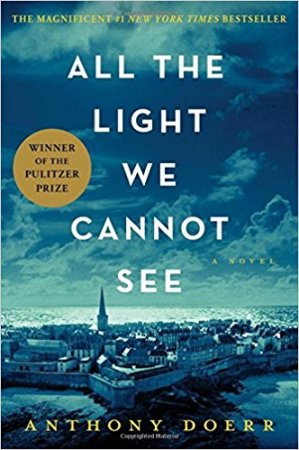 All the Light We Cannot See
All the Light We Cannot See About Grace
About Grace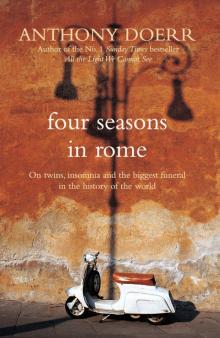 Four Seasons in Rome: On Twins, Insomnia, and the Biggest Funeral in the History of the World
Four Seasons in Rome: On Twins, Insomnia, and the Biggest Funeral in the History of the World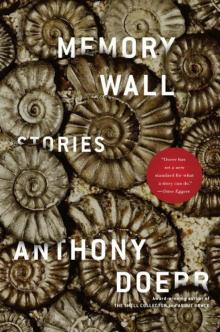 Memory Wall
Memory Wall The Best American Short Stories 2019
The Best American Short Stories 2019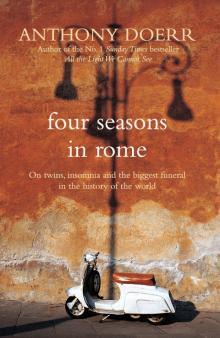 Four Seasons in Rome
Four Seasons in Rome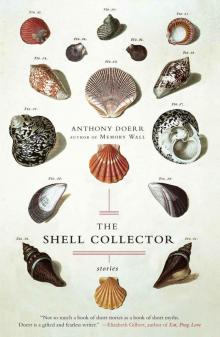 The Shell Collector
The Shell Collector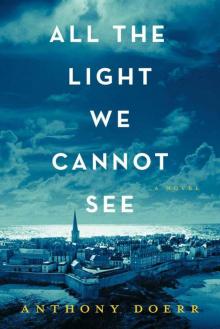 All the Light We Cannot See: A Novel
All the Light We Cannot See: A Novel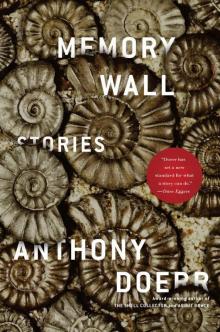 Memory Wall: Stories
Memory Wall: Stories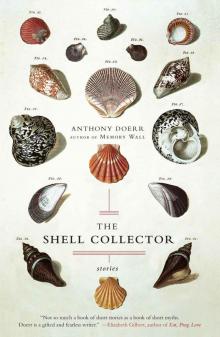 Shell Collector
Shell Collector